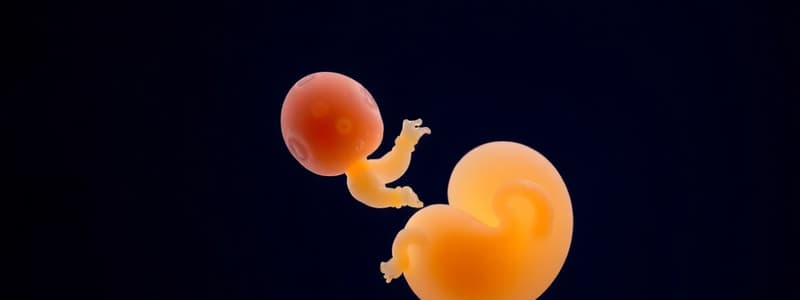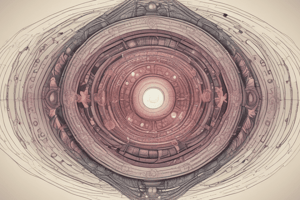Podcast
Questions and Answers
What are the two layers formed by the differentiation of the trophoblast during the second week of development?
What are the two layers formed by the differentiation of the trophoblast during the second week of development?
- Syncytiotrophoblast and Cytotrophoblast (correct)
- Epiblast and Hypoblast
- Endoderm and Ectoderm
- Somatopleuric mesoderm and Splanchnopleuric mesoderm (correct)
Which structure is formed from the inner cell mass during the second week of development?
Which structure is formed from the inner cell mass during the second week of development?
- Somatic mesoderm
- Epiblast and Hypoblast (correct)
- Yolk sac
- Amniotic cavity
Which characteristic is NOT a property of embryonic stem cells?
Which characteristic is NOT a property of embryonic stem cells?
- Self-renewal
- Totipotency
- Limited differentiation (correct)
- Pluripotency
What differentiates adult stem cells from embryonic stem cells in terms of potency?
What differentiates adult stem cells from embryonic stem cells in terms of potency?
During the late second week of development, which structure confirms implantation of the blastocyst?
During the late second week of development, which structure confirms implantation of the blastocyst?
What is the primary role of the syncytiotrophoblast during the second week of development?
What is the primary role of the syncytiotrophoblast during the second week of development?
Which of the following correctly describes the bilaminar disc formed during the second week of development?
Which of the following correctly describes the bilaminar disc formed during the second week of development?
What type of mesoderm fills the space between the trophoblast and the amniotic membrane during the second week?
What type of mesoderm fills the space between the trophoblast and the amniotic membrane during the second week?
At what stage do lacunae develop within the syncytiotrophoblast?
At what stage do lacunae develop within the syncytiotrophoblast?
What is one of the primary functions of extraembryonic mesoderm during the second week of development?
What is one of the primary functions of extraembryonic mesoderm during the second week of development?
Flashcards
Syncytiotrophoblast function
Syncytiotrophoblast function
The outer layer of trophoblast that erodes maternal tissues, allowing maternal blood to enter the lacunar network, initiating the uteroplacental circulation.
Blastocyst embedding
Blastocyst embedding
The process of the blastocyst implanting in the uterine lining by the end of the second week.
Bilaminar disc
Bilaminar disc
The inner cell mass differentiates into epiblast and hypoblast layers.
Extraembryonic mesoderm
Extraembryonic mesoderm
Signup and view all the flashcards
Uteroplacental Circulation
Uteroplacental Circulation
Signup and view all the flashcards
What two layers does the trophoblast differentiate into?
What two layers does the trophoblast differentiate into?
Signup and view all the flashcards
What are the two layers of the inner cell mass?
What are the two layers of the inner cell mass?
Signup and view all the flashcards
Stem cells
Stem cells
Signup and view all the flashcards
Totipotent
Totipotent
Signup and view all the flashcards
Multipotent
Multipotent
Signup and view all the flashcards
Study Notes
Second and Third Weeks of Development
- By the end of the lecture, students will be able to analyze changes during weeks 2 and 3, recognize stem cell types, interpret gastrulation, and link gastrulation to teratogenesis and clinical issues.
Changes During the Second Week
- The blastocyst partly embeds in the endometrial stroma.
- The trophoblast differentiates into the cytotrophoblast and syncytiotrophoblast.
- The cytotrophoblast is an inner, actively dividing layer.
- The syncytiotrophoblast erodes maternal tissues.
- By day 9, lacunae form in the syncytiotrophoblast.
- Maternal blood enters the lacunae forming a primitive uteroplacental circulation.
- Cytotrophoblast forms cellular columns called primary villi, surrounded by the syncytium.
- The blastocyst is completely embedded and the surface defect heals by the end of the second week.
- The inner cell mass (embryoblast) differentiates into the epiblast and hypoblast, forming a bilaminar disc.
- Epiblast cells create amnioblasts which line the amniotic cavity.
- Endoderm cells are continuous with the exocoelomic membrane and together surround the primitive yolk sac.
- Extraembryonic mesoderm develops between the trophoblast, amnion, and exocoelomic membrane. The extraembryonic coelom, or chorionic cavity, forms.
Summary of the Second Week (Week of Twos)
- Trophoblast differentiates into two layers.
- Inner cell mass differentiates into two layers.
- Primary mesoderm splits into somatopleuric and splanchnopleuric mesoderm.
- Amniotic and yolk sac cavities form.
Changes During the Third Week (Trilaminar Germ Disc)
- Gastrulation: The bilaminar embryonic disc transforms into a trilaminar disc.
- This process begins with a primitive streak that forms on the epiblast of the embryonic disc.
- Epiblast cells migrate towards the primitive streak and underneath the epiblast, forming the endoderm layer
- These cells form the mesoderm layer.
- Notochord Formation: Mesenchymal cells create a median cellular cord, the notochord, which develops cranially from the primitive node and pit.
Functions of the Notochord
- Forms the axial skeleton's axis.
- Stimulates the overlying ectoderm to form the central nervous system.
- Degenerates as vertebrae form. Its remnant is the nucleus pulposus of intervertebral discs.
Clinical Applications
- Gastrulation disruptions may occur due to genetic abnormalities, while toxic insults can lead to caudal dysgenesis (sirenomelia).
- Maternal diabetes is associated with extraembryonic abnormalities.
- Primitive streak remnants can develop into tumors in the sacrococcygeal region (sacrococcygeal teratomas).
Studying That Suits You
Use AI to generate personalized quizzes and flashcards to suit your learning preferences.
Related Documents
Description
This quiz focuses on the critical changes during the second and third weeks of embryonic development. Students will explore stem cell types, the process of gastrulation, and its connections to teratogenesis and various clinical implications.




